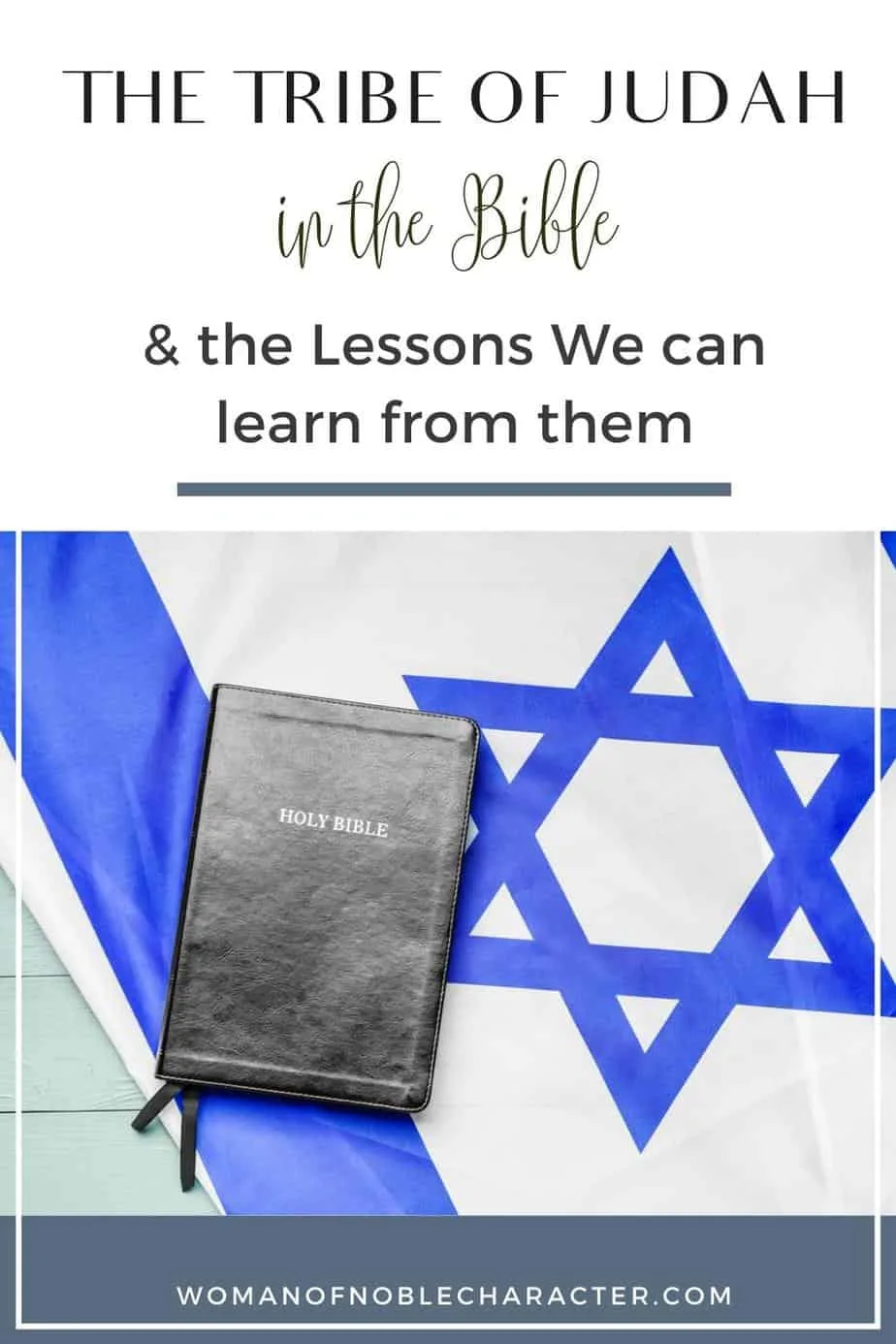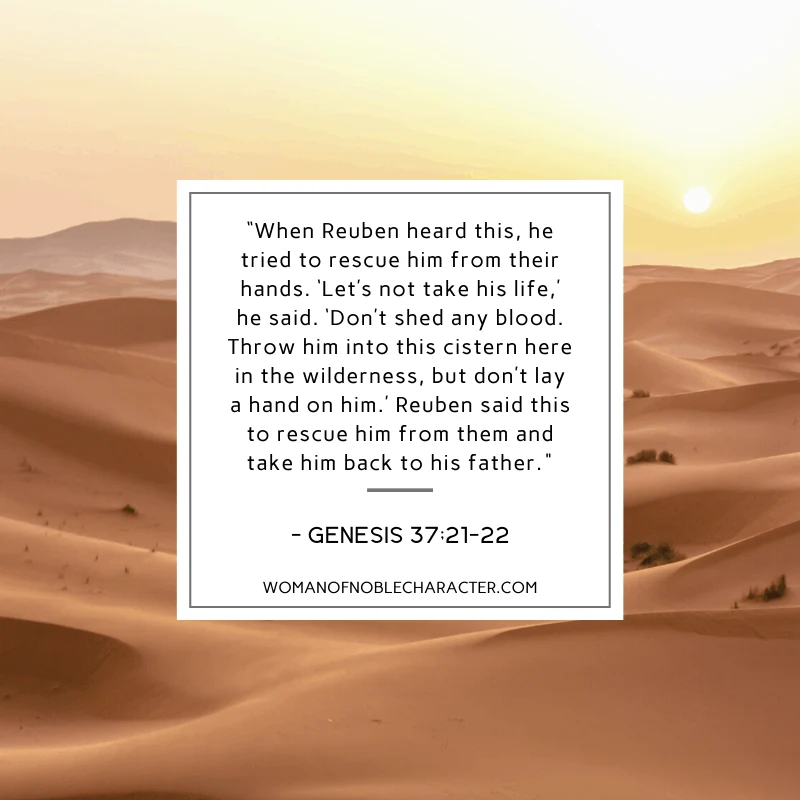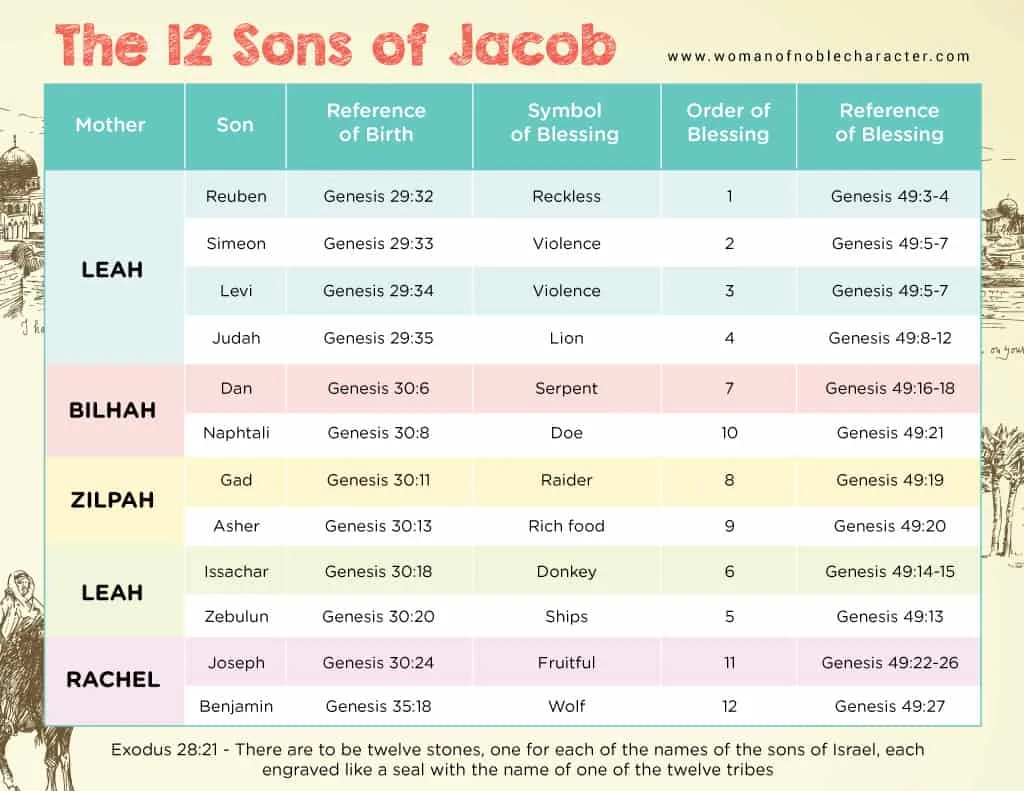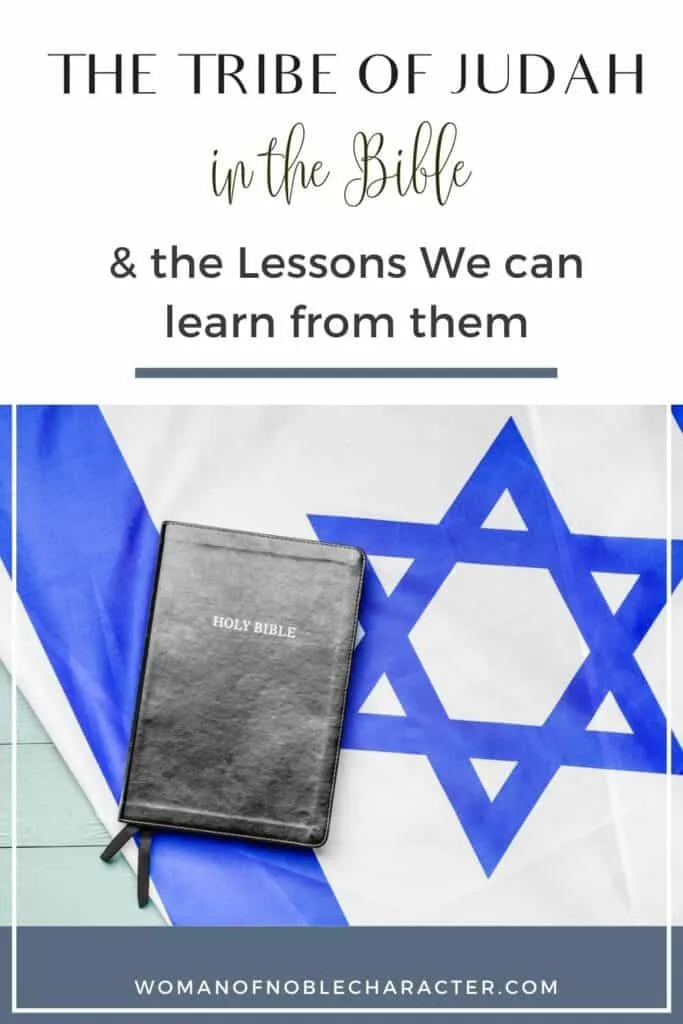This page/post may contain affiliate links. As an Amazon Associate, as well as an affiliate of other programs, this means if you purchase something using these links, I will receive a commission on qualifying purchases at no cost to you! For more detailed information, please visit our Affiliate Disclaimer page
Continuing our series on the Twelve Tribes of Israel (we have previously covered Dan, Napthali, Levi, Simeon, and Reuben, among others) with the Tribe of Judah. Judah was the fourth son of Jacob and his mother was Leah.
The name Judah means acknowledgement (‘hoda’ah,’ as in ‘modeh ani’). Judah’s name also includes the four letters of the Divine name Havaya. The name “Judah” in Hebrew is Yehudah. It is based on the word root “Hodaah” connoting “Give Thanks, Praise”.
And she conceived again and bore a son, and said, “This time I will praise the Lord.” Therefore she called his name Judah. Then she ceased bearing.
Genesis 29: 35 (ESV)

Judah has a rich biblical history and is significant in the lineage of Christ. To better understand the significance of the Tribe of Judah, let’s look at the story of Judah in the Bible
Sibling Rivalry Between the Sons of Jacob
As with all of the sons of Jacob, Judah grew up working in the family business of raising cattle and sheep. Over time, Judah and his brothers became very jealous of their younger brother Joseph. Joseph appeared to be Jacob’s favorite child and, in fact, gave just him a special coat:
Now Israel loved Joseph more than any other of his sons, because he was the son of his old age. And he made him a robe of many colors
Genesis 37:3 (ESV)
If that hadn’t been enough to make the brothers envious of Joseph, when Joseph revealed the dreams he had that one day he would be greater than all of them, their animosity grew to new levels.
Now Joseph had a dream, and when he told it to his brothers they hated him even more. He said to them, “Hear this dream that I have dreamed: Behold, we were binding sheaves in the field, and behold, my sheaf arose and stood upright. And behold, your sheaves gathered around it and bowed down to my sheaf.” His brothers said to him, “Are you indeed to reign over us? Or are you indeed to rule over us?”
Genesis 37:5-11 (ESV)
So they hated him even more for his dreams and for his words.
Then he dreamed another dream and told it to his brothers and said, “Behold, I have dreamed another dream. Behold, the sun, the moon, and eleven stars were bowing down to me.”But when he told it to his father and to his brothers, his father rebuked him and said to him, “What is this dream that you have dreamed?
Shall I and your mother and your brothers indeed come to bow ourselves to the ground before you?” And his brothers were jealous of him, but his father kept the saying in mind.
The hatred the brothers had for Joseph grew stronger – to the point that they actually wanted to kill him. Reuben, the oldest brother, however, stopped them from carrying out their plan.
But when Reuben heard it, he rescued him out of their hands, saying, “Let us not take his life.” And Reuben said to them, “Shed no blood; throw him into this pit here in the wilderness, but do not lay a hand on him”—that he might rescue him out of their hand to restore him to his father.
Genesis 37:21-22 (ESV)

Instead, Joseph was put into a pit. When Reuben wasn’t around, Judah had an idea to sell Joseph to Midianite traders for just 20 shekels of silver (about eight ounces of silver!)
Then Judah said to his brothers, “What profit is it if we kill our brother and conceal his blood? Come, let us sell him to the Ishmaelites, and let not our hand be upon him, for he is our brother, our own flesh.” And his brothers listened to him. Then Midianite traders passed by. And they drew Joseph up and lifted him out of the pit, and sold him to the Ishmaelites for twenty shekelsof silver. They took Joseph to Egypt.
Genesis 37:26-28 (ESV)
To hide what they had done, the siblings killed a goat and covered Joseph’s special coat with the blood of the goat. This way, their father would think that a wild animal had killed Joseph. Jacob was devastated over the loss of his son.
All his sons and all his daughters rose up to comfort him, but he refused to be comforted and said, “No, I shall go down to Sheol to my son, mourning.” Thus his father wept for him.
Genesis 37:35 (ESV)
Judah’s Evil Begets His Misery
So, Judah and his brothers went along thinking they had solved the problem by removing Joseph from the family. God, however, had a plan for Joseph. While Joseph was sold as a slave, God blessed him in Egypt. Judah, however, seemed to pay for his sins through many trials and tragedies throughout his life.
Judah married a Canaanite woman, and together, they had three sons, Er, Onan, and Shelah. Judah found a wife for his firstborn son, Er. Her name was Tamar (more on this later). Er, however, was as wicked as his father, and God took his life.
And Judah took a wife for Er his firstborn, and her name was Tamar. But Er, Judah’s firstborn, was wicked in the sight of the Lord, and the Lord put him to death.
Genesis 38:6-7 ( ESV)
Judah then commanded his second son, Onan, to marry Tamar and produce an heir for his deceased brother as God’s laws have long commanded in such circumstances. Onan would not carry through with this act because it would not be his heir. God then took Onan’s life for his refusal to give his brother an heir.
“Then Judah said to Onan, ‘Sleep with your brother’s wife and fulfill your duty to her as a brother-in-law to raise up offspring for your brother.’ But Onan knew that the child would not be his; so whenever he slept with his brother’s wife, he spilled his semen on the ground to keep from providing offspring for his brother.
Genesis 38:8-10 (ESV)
What he did was wicked in the Lord’s sight; so the Lord put him to death also.”
Judah Gets a Taste of His Own Medicine, and God’s Plans Are Not Ours
After Onan’s passing, Judah asked Tamar to live in her Father’s home until Judah’s youngest son, Shelah, was old enough to marry. Years went by, and by this time, Judah’s own wife had passed. Tamar realized that she would not be given to Shelah in marriage, so she decided to take matters into her own hands.
She had heard that her father-in-law would be in the fields shearing his sheep. She removed her widow’s garments (she was still wearing them after all these years!) and dressed as a harlot. She waited along the road for Judah to pass by. Between what she was wearing and the years that had passed by, Judah didn’t recognize Tamar and propositioned her. She asked for his signet, cord, and staff as collateral. Later, when she realized that she was pregnant, Judah threatened her with death for prostitution. Instead, she showed him the items she held onto for collateral and stated:
About three months later Judah was told, “Tamar your daughter-in-law has been immoral. Moreover, she is pregnant by immorality.” And Judah said, “Bring her out, and let her be burned.” As she was being brought out, she sent word to her father-in-law, “By the man to whom these belong, I am pregnant.” And she said, “Please identify whose these are, the signet and the cord and the staff.” Then Judah identified them and said, “She is more righteous than I, since I did not give her to my son Shelah.” And he did not know her again.
Genesis 38:24-26 (ESV)
The pregnancy resulted in twins, and scripture tells us that during delivery, one twin, Zerah, put his hand out first, and the midwife tied a scarlet thread on it and said, “This one came out first.” However, the second twin, Perez, came out suddenly, followed by his brother with the scarlet thread tied to his wrist.
When the time of her labor came, there were twins in her womb. And when she was in labor, one put out a hand, and the midwife took and tied a scarlet thread on his hand, saying, “This one came out first.” But as he drew back his hand, behold, his brother came out. And she said, “What a breach you have made for yourself!” Therefore his name was called Perez.Afterward his brother came out with the scarlet thread on his hand, and his name was called Zerah.
Genesis 38:27-30 (ESV)
But God! He would use this unusual birth story to establish two lines of genealogy in the tribe of Judah.
God promised Abraham that:
I will bless those who bless you, and him who dishonors you I will curse, and in you all the families of the earth shall be blessed.”
Genesis 12:3 (ESV)

This promise from God would come through the line of Perez. King David and the kings of Judah would descend through the line of Perez. But most importantly, Jesus Christ would come through this line.
and Judah the father of Perez and Zerah by Tamar, and Perez the father of Hezron, and Hezron the father of Ram,
Matthew 1:3 (ESV)
and Jacob the father of Joseph the husband of Mary, of whom Jesus was born, who is called Christ.
Matthew 1:16 (ESV)
Why the tribe of Judah if Judah Was Such a Scoundrel?
When we look at the life of Judah and all of his sins and mistakes, it can make one wonder why his tribe should become one of the most prominent ones of the 12 Tribes of Israel. We can look and see that after everything he went through, Joseph lived a righteous life and was blessed with the birthright in place of Reuben, the firstborn. And, in fact, the name of “Israel” was passed on to Joseph’s two sons, Ephraim and Manasseh. But God uses sinners, as we often see, and God chose Judah (and his descendants) as part of His greater plan.
Each of the twelve sons received a blessing from their father, Jacob, at the end of his life. Jacobs’s blessing for Judah was:
“Judah, your brothers shall praise you;
Genesis 49:8-12 (ESV)
your hand shall be on the neck of your enemies;
your father’s sons shall bow down before you.
Judah is a lion’s cub;
from the prey, my son, you have gone up.
He stooped down; he crouched as a lion
and as a lioness; who dares rouse him?
The scepter shall not depart from Judah,
nor the ruler’s staff from between his feet,
until tribute comes to him;
and to him shall be the obedience of the peoples.
Binding his foal to the vine
and his donkey’s colt to the choice vine,
he has washed his garments in wine
and his vesture in the blood of grapes.
His eyes are darker than wine,
and his teeth whiter than milk.
his teeth whiter than milk.”
And Moses had his own blessing for Judah and his tribe:
And this he said of Judah:
Deuteronomy 33:7 (ESV)
“Hear, O Lord, the voice of Judah,
and bring him in to his people.
With your hands contend for him,
and be a help against his adversaries.”
In this blessing from Jacob, a prophecy, if you will, God felt that Judah was a strong warrior and compared him to a young lion sleeping in its den after devouring its prey. Despite Judah’s many mistakes, it’s possible that God was his strength of character and determination that God decided to choose Judah to be His lawgiver and the tribe from which His Son would later be born.
For it is evident that our Lord was descended from Judah, and in connection with that tribe Moses said nothing about priests.
Hebrews 7:14 (ESV)
In Revelation, Jesus Christ, himself is called “the Lion of the tribe of Judah”:
And one of the elders said to me, “Weep no more; behold, the Lion of the tribe of Judah, the Root of David, has conquered, so that he can open the scroll and its seven seals.”
Revelation 5:5 (ESV)
Judah is also described as a lawgiver in the Psalms. God inspired David to say twice that “Judah is My God’s lawgiver” (or scepter, depending on the translation)
The form you have selected does not exist.
Gilead is mine; Manasseh is mine;
Psalms 60:7 (ESV)
Ephraim is my helmet;
Judah is my scepter.
CLICK ON THE IMAGE BELOW FOR A DOWNLOADABLE, PRINTABLE PDF OF THE 12 SONS OF JACOB

And the same verse is found in Psalm 108:8.
The Tribe of Judah Rises to Prominence
During the time of Moses, the tribe of Judah became stronger and stronger as a tribe (and Judah as a leader) and he “prevailed over his brothers.” The census in Numbers 1 shows that Judah was the leading tribe in population and in men available to go to war.
those listed of the tribe of Judah were 74,600.
Numbers 1:27 (ESV)
After Joshua’s death, God chose the tribe of Judah to take the lead role in conquering the nations who were living in the land promised to the 12 tribes.
The Lord said, “Judah shall go up; behold, I have given the land into his hand.”
Judges 1:2 (ESV)
In the first chapter of Judges, we see that the tribe of Judah was aggressive and strong in driving out the Canaanites in the southern half of the land of Canaan. We later learn that from the line of Judah come King David and, eventually, the “Lion of the tribe of Judah,” Jesus Christ, who will return to establish the Kingdom of God.
God chose David to be His shepherd and Jerusalem for His place to live among His people. God also chose David to hold the “scepter,” a symbol of kingship that would always remain in the tribe of Judah.
The scepter shall not depart from Judah,
Genesis 49:10 (ESV)
nor the ruler’s staff from between his feet,
until tribute comes to him;
and to him shall be the obedience of the peoples.
and also:
I will not violate my covenant or alter the word that went forth from my lips.Once for all I have sworn by my holiness; I will not lie to David.His offspring shall endure forever, his throne as long as the sun before me.Like the moon it shall be established forever, a faithful witness in the skies.” SelahPsalm 89:34-37 (ESV)
The Tribe of Judah and a Divided Nation
When Solomon died, the entire nation of Israel became divided. Rehoboam, Solomon’s son, despite pleas from the tribes, refused to lighten the burden of taxes that had been imposed by his father. He actually, made threats to worsen their lives in other ways. His refusal and threats, resulted in ten of the tribes separating and becoming the northern Kingdom of Israel, with Samaria as the capital city.
So Jeroboam and all the people came to Rehoboam the third day, as the king said, “Come to me again the third day.” And the king answered the people harshly, and forsaking the counsel that the old men had given him, he spoke to them according to the counsel of the young men, saying, “My father made your yoke heavy, but I will add to your yoke. My father disciplined you with whips, but I will discipline you with scorpions.”
1 Kings 12:12-14 (ESV)
The tribes of Judah, Benjamin, and a part of Levi, however, stayed with Rehoboam and became the southern kingdom of Judah, with Jerusalem as its capital. The tribe of Judah was the only tribe of Israel whose inheritance was determined prior to the invasion and conquest of Canaan. Their land was determined by Moses, as a reward for the report Caleb brought back from spying out the land in Numbers 13, and the faith he displayed in God.
The northern kingdom of Israel nearly immediately began practicing idolatry and turned away from worshipping the One True God. After 200 years, they became captives of the Assyrian Empire. The southern kingdom of Judah did marginally better and lasted more than a hundred years after the fall of the northern kingdom of Israel.
However, The Tribe of Judah also turned away from God and worshipped idols several times despite various kings initiating reforms. God even sent prophets to warn them about their idolatry, but they stopped listening to God and the prophets. They were eventually taken into captivity by the Babylonians in beginning of 586 B.C.
What Happened Next to The Tribe of Judah?
Jesus, the Messiah, the Savior of mankind, the Lion of the tribe of Judah—would come through the tribe of Judah, but He would be rejected by His own people.
The Church Jesus established initially sprang out of the tribe of Judah. But since the middle of the first century, the Church of God has become largely non-Jewish in membership.
Approaching the 20th century, many Jewish groups and Christian churches were advocating a homeland in Palestine for the tribe of Judah. Jewish groups wanted to return to Judea because it was their ancient homeland. Christian groups saw the establishment of a Jewish state as a sign of an end-time prophecy being fulfilled that would lead to the imminent return of Jesus Christ. One such prophecy can be found in Daniel 12:11, which indicates that the Jews will resume animal sacrifices before the return of Christ.
Presumably, they would need their own homeland to do this. In 1917 the Balfour Declaration made public Great Britain’s support of a Jewish homeland in Palestine. But it would not become a reality until May 14, 1948. Today, the nation called Israel is a major power in the Middle East, but will it remain such a power until the second coming of Jesus Christ?”
The Tribulation and The Restoration of the Tribe of Judah
Jesus, in His Mount Olivet Prophecy, said:
For then there will be great tribulation, such as has not been from the beginning of the world until now, no, and never will be.
Matthew 24:21 (ESV)
The tribe of Judah and the State of Israel won’t be spared from this devastating period. Luke’s account of the same prophecy quoted Jesus as saying:
“But when you see Jerusalem surrounded by armies, then know that its desolation has come near.
Luke 21:20 (ESV)
In the Old Testament, the prophet Zechariah shared a prophecy about the same period of time:
For I will gather all the nations against Jerusalem to battle, and the city shall be taken and the houses plundered and the women raped. Half of the city shall go out into exile, but the rest of the people shall not be cut off from the city.
Zechariah 14:2 (ESV)
All prophecies point to the same thing: invasion and war will come to Jerusalem and to the Tribe of Judah. However, after Zechariah’s prophecy about the nations of Jerusalem, He shared a prophecy about the good news to come – the coming of our Savior.
On that day his feet shall stand on the Mount of Olives that lies before Jerusalem on the east, and the Mount of Olives shall be split in two from east to west by a very wide valley, so that one half of the Mount shall move northward, and the other half southward.
Zechariah 14:4 (ESV)
And the Lord will be king over all the earth. On that day the Lord will be one and his name one.
Zechariah 14:9 (ESV)
We also hear from Jeremiah about this same time:
In his days Judah will be saved, and Israel will dwell securely. And this is the name by which he will be called: ‘The Lord is our righteousness.’
Jeremiah 23:6 (ESV)
That is what we believers wait in joyful hope for!

Lessons from the Tribe of Judah
Behold, the days are coming, declares the Lord, when I will raise up for David a righteous Branch, and he shall reign as king and deal wisely, and shall execute justice and righteousness in the land. In his days Judah will be saved, and Israel will dwell securely. And this is the name by which he will be called: ‘The Lord is our righteousness.’
Jeremiah 23:5-6 (ESV)
When Jeremiah expounded this prophecy, the kingdom of Judah was about to collapse. The land of Judah was ripe with oppression, violence, idolatry, and political revolution.
The Northern Kingdom of Israel had been forced into captivity 100 years prior, and Judah seemed to have learned nothing from God’s judgment upon them. It was under these circumstances that God gave this prophecy of Jehovah Tsidkenu. (The God of My Righteousness).
1 . Remember that God is our Righteousness
Judah had disobeyed the Lord and continued to turn their backs on the call and destiny God had designed for them. Jeremiah reminds us all of that destiny. When we embrace the Lord, who is our God of Righteousness, then we, too, can appreciate and live out our full purpose. The promises to Judah are our promises, too, as we have been “grafted in.”
2 . We are Called to Praise
And she conceived again and bore a son, and said, “This time I will praise the Lord.” Therefore she called his name Judah. Then she ceased bearing.
Genesis 29:35 (ESV)
This is the first mention of “Judah” in the Bible.
Leah was unloved by Jacob (Genesis 29:31), but God noticed and gave her children. Sons, at that. With the birth of each son, she felt that Jacob might love her more, but he did not.
When Judah was born, Leah decided to praise the Lord despite being unloved by her husband. “This time I will praise the Lord.”
The act of praise is the foundation of Judah’s call and destiny.
3 . We are Meant to be Courageous and Wise Leaders
Even though Judah was the 4th born son of Jacob, the sins of his brothers removed the first three of them from realizing their birthright. It was Judah who stepped into the inheritance and leadership of the firstborn.
It was Judah who pleaded with his brothers to spare Joseph’s life.
It was Judah who pleaded with his father, Jacob, to be honest with the transactions with Joseph in Egypt.
It was Judah that offered his own life as a guarantee for his brother, Benjamin.
Those are just a few examples of how Judah stepped up to provide courageous and wise leadership.
It’s not always easy to step up to lead. It’s not always simple to do the right thing. It’s not always comfortable to give and serve, but Judah provides an example of how we are to lead wisely and courageously – no matter your life or your job title.
4 . We are Called to Go First
Judah went first as Israel marched through the wilderness (Numbers 2:9), Caleb was among the first to see the promised land (Numbers 13), Judah was the first to be assigned an allotment in the promised land (Joshua 14-15:12), Othniel (from Judah was the first judge in Israel (Judges 3:7-11) and the tribe of Judah led the Israelites in battle. (Judges 1:2; 20:18).
We go first, when possible because we have God’s favor upon us. Praise should always be our first response when faced with a problem or even a blessing. Only when we praise first will we have the power and authority to go first in any spiritual battle.
After the death of Joshua, the people of Israel inquired of the Lord, “Who shall go up first for us against the Canaanites, to fight against them?” The Lord said, “Judah shall go up; behold, I have given the land into his hand.”
Judges 1:1-2 (ESV)
Some Interesting Facts About the Tribe of Judah
- According to biblical scholars, blue represented the Tribe of Judah
- The stone representing this tribe was the nofach, which is believed to be a bluish carbuncle commonly taken to mean a garnet.
- The symbol of the Tribe of Judah is a lion. He was compared to both an old and a young lion at one and the same time.
- The tribe of Judah stands out among the twelve tribes because of its association with the house of David, the southern kingdom of Judah, and its capital in Jerusalem.
- Ultimately, the most important member of the line of Judahites is King David. The tribe of Judah was the first to raise him to kingship in Hebron:
After this David inquired of the Lord, “Shall I go up into any of the cities of Judah?” And the Lord said to him, “Go up.” David said, “To which shall I go up?” And he said, “To Hebron.” So David went up there, and his two wives also, Ahinoam of Jezreel and Abigail the widow of Nabal of Carmel. And David brought up his men who were with him, everyone with his household, and they lived in the towns of Hebron. And the men of Judah came, and there they anointed David king over the house of Judah.
2 Samuel 2:1-4 (ESV)
When they told David, “It was the men of Jabesh-gilead who buried Saul,”
The Tribe of Judah was also the first to call him back to his throne after his son Absalom’s revolt
And King David sent this message to Zadok and Abiathar the priests: “Say to the elders of Judah, ‘Why should you be the last to bring the king back to his house, when the word of all Israel has come to the king? You are my brothers; you are my bone and my flesh. Why then should you be the last to bring back the king?’ And say to Amasa, ‘Are you not my bone and my flesh? God do so to me and more also, if you are not commander of my army from now on in place of Joab.’”And he swayed the heart of all the men of Judah as one man, so that they sent word to the king, “Return, both you and all your servants.”So the king came back to the Jordan, and Judah came to Gilgal to meet the king and to bring the king over the Jordan.2 Samuel 19:11-15 (ESV)
Later, during their exile, Daniel of the tribe of Judah became a model for righteous behavior and faithfulness:
Among these were Daniel, Hananiah, Mishael, and Azariah of the tribe of Judah.
Daniel 1:6 (ESV)
You may enjoy this short, but informative video on the history of ancient Israel and Judah:
Or one of these recommended resources:
Fiction:
I recently read this book based on the life of Daniel and really enjoyed it.
Of Fire and Lions: A Novel by Mesu Andrews
I’ve also read this one and recommend it.
Bathsheba: A Novel (The Wives of King David) by Jill Eileen Smith
Judah’s Scepter and the Sacred Stone by D A Brittain
Non-Fiction/Further Study
The 12 Tribes of Israel (or is it 14?) & Lessons We Can Learn by Susan J Nelson
Staying in Rhythm with the Lion of The Tribe of Judah! by A Book Written Ho Through a Vessels
The Life of King David: How God Works Through Ordinary Outcasts and Extraordinary Sinners by J S Park
What lessons do you take away from the story of the Tribe of Judah? The major theme I see here is that we all make mistakes. We all sin, but God has a plan for each of us in His Kingdom. Plans that we cannot even imagine. What about you?
Drop a comment to share what you learned from the history of the Tribe of Judah.
Because He Lives,
Sue
ESV – “Scripture quotations are from The ESV® Bible (The Holy Bible, English Standard Version®), copyright © 2001 by Crossway, a publishing ministry of Good News Publishers. Used by permission. All rights reserved.”


Kristine
Friday 5th of August 2022
Joseph is Patriarch of Messiah. Of this there can be no doubt. Judah married a Canaanite woman, and his first two sons with her were struck dead, they were so evil. Finally, Judah married Tamar, his daughter-in-law and twins were the issue of this incestuous union. Judah was called to the front lines in order that he would be destroyed first. Achan was of Judah also. What more do you need to know.
Also: the tribe of Dan is Germany, Assyria, the King of the North.
Amy
Saturday 5th of March 2022
Hi Sue,
Thank you for all you do, especially the history of Judah. It was very encouraging for all of us to comprehend it; and we are continuing to comprehend on other tribes and the purposes.
May I please recommend for the video to be close-captioned? Much appreciated.
Blessings, Amy
Susan Nelson
Sunday 6th of March 2022
I'm so glad that it blessed you. I'm currently working on close-captioning all of my videos. Thank you for the suggestion. Also, thank you for sharing and for stopping by. Have a beautiful, blessed day!